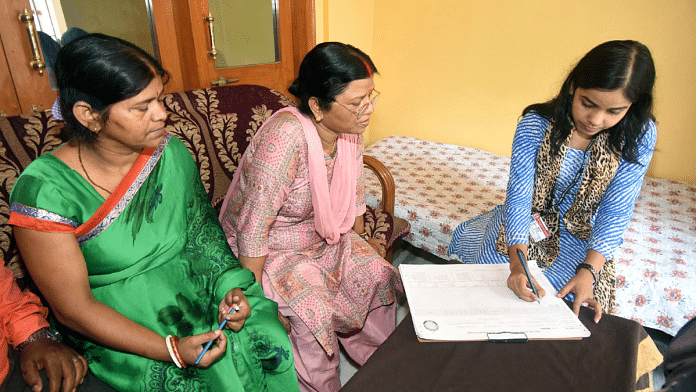New Delhi: The Modi government opposed Bihar’s caste survey in the Supreme Court Monday, saying that a census is a statutory process under a central legislation and that the law empowers only the central government to conduct it.
The affidavit comes in response to a bunch of petitions filed in the top court challenging the Patna High Court’s 1 August judgment that allowed the state to carry out the exercise. An SC bench led by Justice Sanjeev Khanna had last week refused to halt the ongoing exercise, saying that it won’t put a stop to it unless there is a prima facie case to show some violation.
At the last hearing, Solicitor General Tushar Mehta had sought time to place the central government’s stand on the issue.
On Monday morning, the Registrar General of India (RGI) Ministry of Home Affairs filed an affidavit to say that “no other body under the Constitution or otherwise is entitled to conduct the exercise of either census or any action akin to census”. However, in the evening, the RGI office filed a fresh affidavit withdrawing this contention. It said that this submission inadvertently crept in the old affidavit, which, it said, stands withdrawn.
However, the second affidavit maintained that a census is governed by the Census Act, 1948, and is hence a statutory process. It submitted that the subject of census is covered in the Union List under Entry 69 of the Seventh Schedule.
In exercise of the powers under the Entry 69, only the central government can conduct the census, the affidavit said. It quoted Section 3 of the 1948 Act, which says: “The Central Government, may, by notification, in the Official Gazette, declare its intention of taking a census in the whole or any part of the territories to which this Act extends whenever it may consider it necessary or desirable so to do, and thereupon the census shall be taken.”
Bihar government counsel Manish Singh rubbished the Centre’s affidavit as false and said it has missed mentioning a law that allows the state to conduct the caste census.
“Collection of Statistics Act, 2008, authorises the state government to carry out all kinds of census and survey, including caste survey. Also, the Bihar Backward Commission Act, 1993, mandates the state to carry out such a survey,” Singh said.
Further, he added, the affidavit is also contemptuous because it is in abrogation of an earlier apex court order in which the Centre was directed to carry out a caste-based survey in Kerala. This order was given in June 2021 by a three-judge bench led by Justice R.F. Nariman on an appeal filed by the Centre challenging a Kerala HC directive, asking it and the Kerala government to conduct the caste-based census.
“While dismissing the Centre’s appeal, the top court had given one year’s time to finish the task,” Singh said.
The Bihar government — formed by the grand alliance of the Janata Dal (United), the Rashtriya Janata Dal and Congress, along with other parties — has backed the caste census to “further the cause of social justice in the state”.
While opposing the petitioners’ demand in the Supreme Court to stay the survey, the state had said that the census is adding only the cumulative results of the survey and no personal details of individuals would be made public. The petitioners have contended that the survey was in breach of the SC verdict on right to privacy and that the state cannot carry out an exercise through an administrative order, in the absence of a statutory law.
Affirming the state’s 6 June 2022 notification, which announced the survey, the Patna HC had in its judgment, delivered earlier this month, said: “We find the action of the state to be perfectly valid, initiated with due competence, with the legitimate aim of providing ‘Development with Justice’…and the actual survey to have neither exercised nor contemplated any coercion to divulge the details and having passed the test of proportionality, thus not having violated the rights of privacy of the individual especially since it is in furtherance of a ‘compelling public interest’ which in effect is the ‘legitimate state interest’.”
(Edited by Gitanjali Das)
Also Read: No caste without code—Bihar is counting and writing a new identity politics



